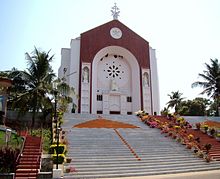Syro-Malabar Catholic Eparchy of Palai
| Eparchy of Palai | |
|---|---|
 |
|
| Location | |
| Country | India |
| Ecclesiastical province | Syro-Malabar Catholic Archeparchy of Changanassery |
| Metropolitan | Syro-Malabar Catholic Archeparchy of Changanassery |
| Statistics | |
| Area | 2,017 km2 (779 sq mi) |
| Population - Total - Catholics |
(as of 2009) 695,000 326,747 (47%) |
| Information | |
| Established | 25 July 1950 |
| Cathedral | Cathedral of St Thomas in Palai |
| Patron saint |
Immaculate Conception St Thomas |
| Current leadership | |
| Bishop | Joseph Kallarangatt |
| Website | |
| Website of the Eparchy | |
The Syro-Malabar Eparchy of Palai is a Syro-Malabar Catholic eparchy with an area of 1166 km2 comprising the Meenachil Taluk and a few villages of the neighbouring Taluks in Kottayam, Ernakulam, and Idukki districts of Central Kerala in South India. The faithful of this eparchy, numbering 326,742, belong to the ancient St. Thomas Christian Community.
Pope Pius XII, by the Bull "Quo Ecclesiarum", issued on 25 July 1950, bifurcated the eparchy of Changanacherry and out of the territory covered by the then Foranes of Palai, Muttuchira, Kuravilangad, Anakkallu and Ramapuram erected the eparchy of Palai as a suffragan of the Archeparchy of Ernakulam. Most Rev. Dr. Leo P. Kierkels, the Apostolic Internuncio in India, published the Bull in the St. Thomas Cathedral Palai on 4 January 1951 and installed Mar Sebastian Vayalil as the first Bishop of the new eparchy. On the 22 of August 1956 when the Holy See by the Ap.Const. ‘Regnum Coelorum’ raised the eparchy of Changanacherry to the status of an Archeparchy and constituted the new ecclesiastical province of Changanacherry, the eparchy of Palai became one of its suffragans. Mar Joseph Kallarangatt is the current Bishop of the eparchy.Mar Jacob Muricken was appointed as auxiliary bishop in 2012.
Venerable Sister Alphonsa was beatified along with Father Kuriakose Elias Chavara, T.O.C.D., at Kottayam, on 8 February 1986 by Pope John Paul II during his Apostolic Pilgrimage to India. During his speech at Nehru Stadium, the Pope said that: "From early in her life, Sister Alphonsa experienced great suffering. With the passing of the years, the heavenly Father gave her an ever fuller share in the Passion of his beloved Son. We recall how she experienced not only physical pain of great intensity, but also the spiritual suffering of being misunderstood and misjudged by others. But she constantly accepted all her sufferings with serenity and trust in God, … She wrote to her spiritual director: "Dear Father, as my good Lord Jesus loves me so very much, I sincerely desire to remain on this sick bed and suffer not only this, but anything else besides, even to the end of the world. I feel now that God has intended my life to be an oblation, a sacrifice of suffering" (20 November 1944). She came to love suffering because she loved the suffering Christ. She learned to love the Cross through her love of the crucified Lord. On Sunday, 12 October 2008, Pope Benedict XVI announced her canonization at a ceremony at Saint Peter's Square. Indians from across the world, especially people from Kerala, gathered at the ceremony in Rome. Among them was a 10-year-old Kerala boy Jinil Joseph whose clubfoot – a birth defect – was, in the judgment of Vatican officials, miraculously healed after prayers to Alphonsa in 1999. In the homily, Pope Benedict XVI recalled Saint Alphonsa's life as one of "extreme physical and spiritual suffering." "This exceptional woman … was convinced that her cross was the very means of reaching the heavenly banquet prepared for her by the Father", the pope stated. "By accepting the invitation to the wedding feast, and by adorning herself with the garment of God's grace through prayer and penance, she conformed her life to Christ's and now delights in the 'rich fare and choice wines' of the heavenly kingdom." "(Her) heroic virtues of patience, fortitude and perseverance in the midst of deep suffering remind us that God always provides the strength we need to overcome every trial", the pope stated before the ceremony ended. The grave at St Mary's Forane Church in Bharananganam where the Franciscan Clarist Sister was buried had a chapel built there, which houses her mortal remains.
...
Wikipedia
